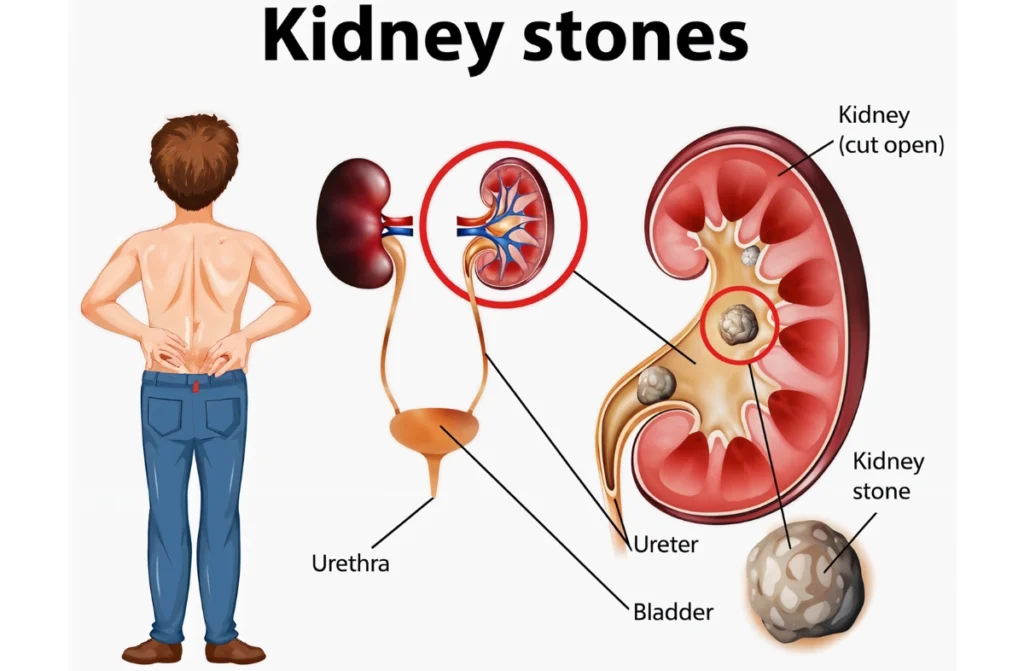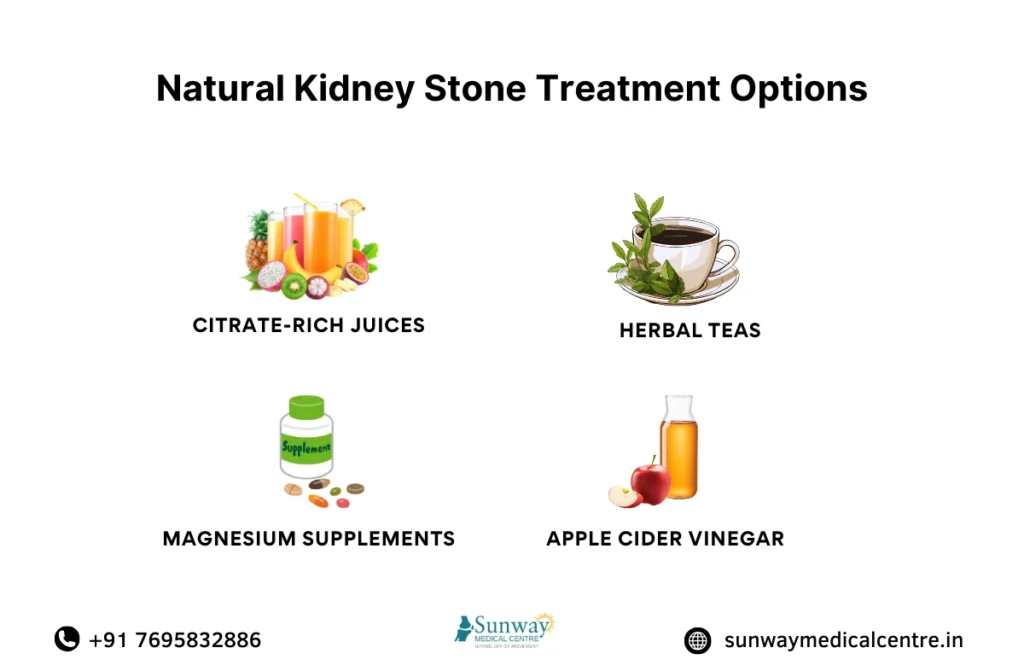Kidney stones can be a painful and challenging condition, but there is hope with kidney stones treatment in Chennai. At Sunway Medical Centre, we specialize in advanced care for kidney stones, offering the latest technology and expertise to ensure a quick and effective recovery. Whether you’re seeking answers or relief, our goal is to provide personalized solutions to meet your needs.
What is a Kidney Stone?
Kidney stones are solid deposits of minerals and salts that develop within the kidneys. They can vary in size, from tiny particles to larger stones that may block the urinary tract. These stones develop when substances like calcium, oxalate, and uric acid in the urine become concentrated, forming crystals. If not treated, kidney stones can lead to severe pain and complications.
Key Takeaways:
- Kidney stones are caused by the crystallization of minerals in the urine.
- They can obstruct the urinary tract, leading to discomfort and health risks.
Kidney stones are common across all age groups, but they tend to occur more frequently in individuals aged 30-50 years. Awareness about their causes and symptoms is crucial for early diagnosis and treatment.
Causes
Multiple factors can play a role in the development of kidney stones:
- Dehydration: Not drinking enough water increases the concentration of minerals in the urine, leading to stone formation.
- Diet: High salt, sugar, or protein intake can trigger stone development.
- Medical Conditions: Chronic illnesses like diabetes, gout, or obesity may increase the risk of kidney stones.
- Genetics: A family history of kidney stones makes you more susceptible.
- Medications: Certain medications, including diuretics and calcium supplements, can also increase the risk of stone formation.
Prevention Tip:
Drink plenty of water and follow a balanced diet to help lower the risk of kidney stones. Adding lemon or lime to your water can also help as the citrate in these fruits can inhibit stone formation.
Incorporating these simple preventive measures into your lifestyle can make a significant difference in reducing your risk of kidney stones.

Signs and Symptoms
Common symptoms of kidney stones include:
- Severe pain in the back or side, often radiating to the lower abdomen.
- Pain during urination.
- Blood in the urine, which may appear pink, red, or brown.
- Nausea and vomiting.
- Frequent urge to urinate or difficulty passing urine.
- Cloudy or foul-smelling urine in some cases.
If you experience these symptoms, consult a specialist for kidney stones treatment in Chennai to avoid complications. Symptoms can vary based on the size and location of the stone, but even small stones can cause significant discomfort if not treated promptly.
Types of Stones
Understanding the type of kidney stone is essential for effective treatment. The common types include:
- Calcium Stones: The most common type, formed from calcium oxalate or phosphate.
- Uric Acid Stones: Frequently occur in people with high-protein diets or those suffering from gout.
- Struvite Stones: Often caused by urinary tract infections and tend to grow rapidly.
- Cystine Stones: Rare stones caused by a genetic disorder that results in excessive cystine in the urine.
Each type requires a tailored approach to ensure effective removal and prevention of recurrence. Identifying the type of stone through proper diagnosis is the first step in creating a treatment plan.
Kidney Stones Treatment in Chennai
For kidney stones treatment in Chennai, our approach ensures a smooth and comfortable recovery. Early intervention is key to avoiding complications and ensuring a faster return to normal activities.
Treatment Options:
- Medication: For smaller stones, medications can help dissolve or pass them naturally. Pain relievers are also prescribed to manage discomfort.
- Extracorporeal Shock Wave Lithotripsy (ESWL): A non-invasive procedure that uses shock waves to break stones into smaller pieces, allowing them to pass naturally.
- Ureteroscopy: A minimally invasive technique to remove stones using a thin scope. It is ideal for stones located in the ureter or kidney.
- Kidney Stone Laser Treatment in Chennai: Advanced laser technology for precise and painless stone removal.
Our comprehensive approach ensures that every patient receives the best kidney stone treatment in Chennai.
Symptoms of Kidney Stones
Kidney stones often do not cause symptoms until they start moving within the kidney or pass into the ureter. When they do, they can cause severe pain and discomfort, leading to the need for kidney stone treatment.
Common Symptoms Include:
- Severe pain in the lower back, side, or abdomen
- Painful urination or burning sensation while urinating
- Frequent urge to urinate with small amounts of urine
- Blood in urine (Hematuria), Presence of blood in the urine, which can look pink, red, or brown.
- Nausea and vomiting due to intense pain
- Fever and chills in cases of infection
- Cloudy or foul-smelling urine, indicating possible infection
If any of these symptoms occur, it is essential to seek medical attention for proper kidney stone treatment to prevent complications. Drinking plenty of water and following a balanced diet can help manage symptoms and support stone passage.
Causes of Kidney Stones
Kidney stones form when minerals and salts in urine crystallize and stick together, creating hard deposits in the kidneys. Several factors can increase the risk of stone formation, leading to the need for kidney stone treatment.
Common Causes Include:
- Dehydration – Lack of water concentrates urine, leading to stone formation
- Diet High in Oxalates and Salt – Foods like spinach, nuts, and processed foods can contribute to kidney stones
- High Protein Intake – Excess animal protein increases uric acid levels, raising the risk of stones
- Obesity – Weight gain can lead to metabolic changes, promoting kidney stone development
- Medical Conditions – Conditions like urinary tract infections, hyperparathyroidism, and digestive diseases can cause stones
- Family History – Genetics play a role in kidney stone formation
Maintaining proper hydration, a balanced diet, and regular checkups can help prevent kidney stones and reduce the need for kidney stone treatment.

Kidney Stone Laser Treatment and Cost
Laser treatment is an innovative method to remove kidney stones. This procedure uses a laser to break the stones into small fragments that can be easily passed or removed. It is particularly effective for complex or hard-to-reach stones.
Benefits
- Minimally invasive with faster recovery.
- Reduced risk of complications such as infections or scarring.
- Effective for both small and large stones, offering precise control.
Kidney Stone Laser Treatment Cost in Chennai
The cost of laser treatment varies based on the size, type, and location of the stones. Additional factors like diagnostic tests and aftercare also influence the total expense. At Sunway Medical Centre, we provide affordable and transparent pricing for kidney stone laser treatment cost in Chennai, ensuring access to high-quality care without financial stress.
Transparent pricing and personalized care make laser treatment an increasingly popular choice for patients in Chennai.
Common Conditions Requiring Kidney Stone Removal
Certain situations demand prompt kidney stone removal in Chennai, including:
- Stones causing severe pain or urinary obstruction that do not respond to medications.
- Large stones that cannot pass naturally and risk damaging the kidneys.
- Recurrent infections due to stones, which can lead to long-term health problems.
- Stones leading to kidney damage, reducing overall kidney function.
Our state-of-the-art facilities ensure effective stone removal using the latest techniques and equipment. Ignoring symptoms can lead to complications like infections or kidney failure, making timely removal crucial.
Prevention of Kidney Stones
Preventing kidney stones treatment in chennai involves making simple lifestyle changes that have long-term benefits for overall health:
- Stay Hydrated: Drink at least 2-3 liters of water daily. Keeping urine diluted reduces the chances of stone formation.
- Limit Salt and Protein Intake: High sodium levels increase calcium in the urine, while excessive protein can raise uric acid levels.
- Consume Calcium-Rich Foods: Adequate dietary calcium can prevent oxalate from being absorbed, reducing stone formation.
- Monitor Oxalate Levels: Limit foods like spinach, beets, and chocolate if you are prone to oxalate stones.
- Stay Physically Active: Regular exercise helps maintain a healthy weight, reducing the risk of stone formation.
Following these tips can help avoid the need for frequent kidney stones treatment in Chennai. Consulting with a nutritionist or specialist can provide a more tailored prevention plan.
Diagnosis of Kidney Stones
Diagnosing kidney stones requires accurate and timely tests. Our diagnostic tools include:
- Imaging Tests: X-rays, ultrasounds, or CT scans to detect stones and assess their size and location.
- Urine Tests: Analyze for crystal-forming substances and evaluate overall kidney health.
- Blood Tests: Check for high levels of calcium, uric acid, or other substances that contribute to stone formation.
Early diagnosis is crucial for effective treatment, making us the go-to choice for the best kidney stone treatment in Chennai.
Risk Factors
Certain factors increase the likelihood of developing kidney stones:
- Dehydration: Lack of sufficient water intake leads to concentrated urine, which can form stones.
- Obesity: Excess body weight alters urine composition, increasing stone risk.
- Dietary Habits: High intake of salt, sugar, and protein can contribute to stone formation.
- Family History: Genetics play a significant role in predisposing individuals to kidney stones.
- Medical Conditions: Chronic illnesses like diabetes, hyperparathyroidism, or inflammatory bowel disease.
Understanding these risks helps in early prevention and reduces the need for kidney stone removal in Chennai.
Diet and Lifestyle Recommendations
Making changes to your diet and lifestyle can significantly reduce the risk of kidney stones:
- Increase Fluid Intake: Drinking water throughout the day helps dilute urine.
- Limit Sodium: High salt levels can increase calcium in the urine.
- Balance Calcium Intake: Too much or too little calcium can contribute to stone formation.
- Reduce Oxalate-Rich Foods: Foods like nuts, chocolate, and certain vegetables should be consumed in moderation.
- Stay Active: Regular exercise helps regulate body weight, reducing the risk of stones.
Implementing these habits can help avoid future complications and minimize the need for kidney stones treatment in Chennai. Simple dietary changes can have a significant impact on long-term kidney health.
Conclusion
When it comes to kidney stones treatment in Chennai, Sunway Medical Centre stands out for its expertise and personalized care. From accurate diagnosis to advanced treatments like kidney stone laser treatment in Chennai, we ensure a smooth and hassle-free experience. If you’re looking for effective and affordable care, including kidney stone laser treatment cost in Chennai, trust us for the best solutions.




